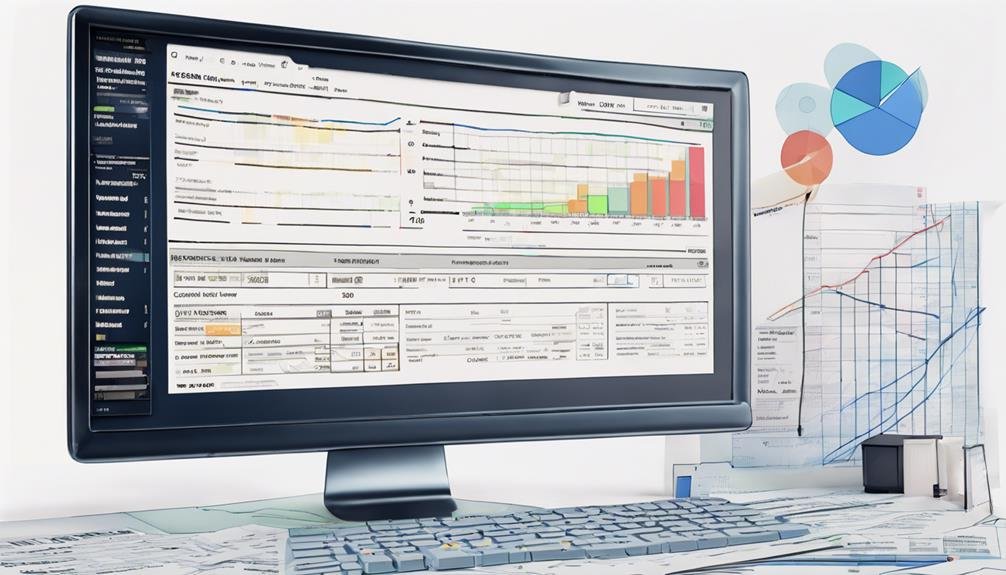Exploring the complex world of cryptocurrency tax implications in the US entails understanding key regulations to guarantee compliance and minimize tax burdens efficiently. Categorized as property, cryptocurrencies trigger tax obligations upon various events, such as selling or receiving them as income. Understanding cost basis is essential, impacting tax calculations and rates ranging from 0% to 20%.
Offsetting gains with losses can reduce overall tax liabilities, while detailed record-keeping is necessary for accurate reporting. Staying updated on regulations, consulting tax professionals for tailored advice, and tracking all transactions are essential steps toward tax compliance and effective portfolio management. Investigating further will reveal insights into maximizing benefits and avoiding penalties in cryptocurrency taxation.
Brief Overview of Top 10 Cryptocurrency Tax Implications In The US
- Cryptocurrency is taxed as property; capital gains apply.
- Understand the cost basis for accurate tax calculations.
- Offsetting gains with losses reduces tax liabilities.
- Staking and mining rewards are taxable events.
- Stay updated on regulations to ensure compliance.
US Cryptocurrency Tax Overview
When dealing with cryptocurrency in the US, it is essential to understand the tax implications involved. The IRS categorizes digital assets as property for tax purposes, meaning transactions with cryptocurrency are subject to taxation. Capital gains taxes come into play when you make profits from selling cryptocurrencies. This tax is calculated based on the difference between the purchase and selling prices.
It’s important to remember that any income received in cryptocurrency is also taxable, and the value is determined at the time of receipt. These events where taxes are applicable are known as taxable events. Remember, complying with US crypto tax laws is mandatory. Failure to do so can result in penalties. To ensure you meet your tax obligations and avoid any issues, keep detailed records of your cryptocurrency transactions and consult a tax professional if needed. Stay informed and proactive to navigate the crypto tax landscape safely.
Capital Gains Taxation

Understanding the concept of cost basis is essential to accurately calculating capital gains tax on your cryptocurrency transactions. Cryptocurrency capital gains tax rates in the US vary from 0% to 20%, based on how long you have owned the assets and your income bracket. Short-term gains, held for a year or less, are taxed as ordinary income, while long-term gains, held over a year, come with lower tax rates.
You can net your capital gains and losses with a yearly deduction limit for excess losses in cryptocurrency transactions. Knowing your cost basis is vital for precise capital gains tax calculations when dealing with cryptocurrency trades or sales. Remember that capital gains tax implications come into play when you sell or dispose of your cryptocurrency assets, following similar taxation rules for stocks and property. Stay informed and ensure you accurately report your gains to comply with tax regulations.
Losses and Offsetting Gains

Offsetting gains with losses in cryptocurrency trading can effectively reduce your overall tax liabilities. When you sell cryptocurrency at a loss, this loss can be used to offset gains from other investments, helping to lower your taxable income. The IRS allows you to reduce your net profits by up to $3,000 in losses annually. If your losses exceed $3,000, the remaining amount can be carried over to future years for tax purposes.
You can significantly decrease your tax obligations by strategically utilizing losses from cryptocurrency transactions. This practice is a common and essential strategy many investors use to manage their tax liabilities in the cryptocurrency market. Remember that documenting your losses accurately and keeping detailed records of all transactions is vital for tax reporting. Consult with a tax professional to ensure you follow the regulations and maximize your opportunities to offset gains with losses effectively.
Wallet Changes Tax Considerations

Considering the tax implications of changing wallets for your cryptocurrency holdings is vital for managing your overall tax obligations effectively. When you transfer cryptocurrency between wallets, it does not trigger any tax liabilities. The critical point is that taxes are only incurred when you sell or dispose of cryptocurrency for profit. Hence, moving your crypto assets between wallets is okay with your tax situation. Changing wallets to store your digital currencies is a routine practice that does not necessitate you to report anything to the tax authorities.
It’s essential to stay informed about the tax implications of your actions in cryptocurrency. Understanding that taxes are only triggered upon selling or disposing of cryptocurrency allows you to navigate wallet changes without unnecessary tax burdens. Remember to accurately report any taxable events, such as the sale of cryptocurrency, to guarantee compliance with tax regulations. Keeping track of these transactions will help you handle your tax obligations responsibly.
Staking and Mining Rewards Taxation

When staking or mining cryptocurrencies, it is crucial to be aware that the IRS considers the rewards and income generated from these activities as taxable events. Here are some key points to take into account regarding the taxation of staking rewards and mining income:
- Taxable Events: Both staking rewards and mining income are subject to taxation treated as ordinary income by the IRS.
- Reporting Requirements: It is vital to accurately report the fair market value of the received staking rewards and mining income for tax compliance purposes.
- Record-Keeping: Keeping detailed records of your staking and mining activities is essential. This documentation will help you accurately report your crypto-related income and comply with tax regulations.
Crypto-to-Crypto Trades Implications

When it comes to crypto-to-crypto trades, the IRS considers them taxable events. The cryptocurrency’s fair market value determines the taxable amount during the trade. Ensuring accurate reporting of these trades is essential for meeting tax compliance requirements.
Tax on Exchanges
Exchanging cryptocurrencies for other digital assets triggers tax obligations as per the IRS regulations. When participating in crypto-to-crypto trades on exchanges, it is crucial to grasp the tax implications to guarantee compliance and avoid penalties. Here are key points to keep in mind:
- Each trade is deemed a taxable event, necessitating reporting for capital gains tax purposes.
- Capital gains tax is computed based on the profit or loss from the trade, considering the difference between the purchase and selling prices.
- Keeping detailed records of all crypto-to-crypto trades, including the fair market value at the time of each trade, is vital for accurate tax reporting and to demonstrate compliance with IRS regulations. Remember, thorough record-keeping can help you navigate tax season smoothly.
Cost Basis Calculation
Calculating the cost basis in crypto-to-crypto trades is essential in accurately determining gains or losses for tax reporting purposes. The cost basis is the original value of the asset. It is necessary to calculate capital gains or losses when trading cryptocurrencies. To determine the cost basis in crypto-to-crypto trades, you must establish the cryptocurrency’s value at the time of acquisition and sale.
Understanding this calculation is critical for proper tax reporting and compliance with IRS regulations. By tracking the cost basis correctly, you can reduce tax liabilities and guarantee precise reporting of gains or losses. Stay informed about the cost basis in your crypto transactions to maintain accurate records for tax purposes and financial transparency.
Utilizing Tax Calculation Software

Using tax calculation software, you can streamline the process of accurately determining gains, losses, and tax liabilities related to your cryptocurrency transactions. Here are some key benefits of using such software:
- Automation: Tax calculation software can automate calculating gains and losses, saving you time and ensuring accuracy.
- Integration: These tools can integrate with exchanges and wallets to track transactions seamlessly and provide you with accurate tax reports.
- Compliance: Utilizing tax calculation software can help you stay compliant with IRS regulations, reducing the risk of errors in reporting and potential penalties.
Importance of Staying Informed

Staying informed on cryptocurrency tax implications is essential for your financial well-being. By staying updated on regulations, consulting tax professionals, and tracking your crypto transactions diligently, you can confidently navigate cryptocurrency taxation’s complexities. Keeping abreast of changes in tax laws and seeking expert advice will guarantee compliance and help you make informed decisions about your investments.
Stay Updated on Regulations
To stay compliant with IRS guidelines and avoid penalties, keeping yourself informed about the latest cryptocurrency tax regulations is essential. Here are some key reasons why staying updated on regulations is necessary:
- Understanding Changes: Tax laws can impact how cryptocurrency transactions are taxed, making it essential to stay informed about regulatory updates.
- Accurate Reporting: Knowing the latest regulations helps accurately report crypto income and transactions to the IRS.
- Maximizing Benefits: Keeping abreast of regulatory developments can assist in maximizing deductions and credits, reducing taxable income and overall tax liability.
Consult Tax Professionals
Staying informed about cryptocurrency tax regulations is essential for ensuring compliance; seeking advice from tax professionals can offer invaluable guidance in effectively maneuvering through this intricate landscape. Tax professionals are equipped to provide personalized advice tailored to your financial situation and goals. By staying connected with tax experts, you can remain updated on the latest tax changes and optimize your tax strategies regarding cryptocurrency transactions.
These professionals can help you minimize tax liabilities and maximize deductions, ensuring you handle cryptocurrency tax implications accurately. Collaborating with tax professionals offers peace of mind and instills confidence in your tax compliance. Remember, consulting tax professionals is a prudent step towards traversing the complex world of cryptocurrency taxes quickly and ensuring full compliance.
Track Crypto Transactions
Maintaining precise records of your crypto transactions is essential to guarantee compliance with IRS tax reporting requirements and avoid potential penalties and legal consequences. To make sure you stay on track with your taxable income, follow these steps:
- Track All Transactions: Document buying, selling, trading, and using crypto for payments.
- Report Crypto Activity: Accurately report all cryptocurrency transactions to the IRS.
- Keep Detailed Records: Record each transaction’s gains, losses, and cost basis.
Compliance With Tax Regulations

Ensuring adherence to US cryptocurrency tax regulations is essential for accurately reporting income and avoiding penalties. Regarding tax compliance, reporting gains from cryptocurrency transactions is vital. The IRS considers digital assets property, meaning taxpayers must follow federal tax laws when dealing with crypto. Whether you’re receiving payment in cryptocurrency as an employee or independent contractor, it’s crucial to understand your tax obligations.
Employers paying in crypto must withhold federal taxes, while independent contractors must manage self-employment taxes themselves. Miners receiving virtual currency must report the fair market value for tax purposes. By following these guidelines and ensuring adherence to tax regulations, you can avoid potential penalties and ensure your cryptocurrency income is accurately reported to the IRS. Remember, staying informed and meeting your tax obligations is critical to a stress-free financial future in cryptocurrency.
Effective Portfolio Management

When managing your cryptocurrency portfolio effectively, thinking about tax-efficient investment strategies and maintaining detailed record-keeping practices is essential. You can optimize returns and reduce potential losses by diversifying your investments and balancing risk levels. Regularly monitor market trends and adjust your holdings to stay disciplined and strategic.
Tax-Efficient Investment Strategies
To effectively manage your cryptocurrency investments with minimal tax implications, contemplate employing tax-efficient strategies such as optimizing portfolio holdings for long-term capital gains benefits. Holding onto your digital assets for over a year can qualify you for lower long-term capital gains tax rates, reducing the taxes you owe. Additionally, utilizing tax-loss harvesting by selling off losing assets to offset gains can further decrease your overall tax obligations.
Another critical investment strategy is to contemplate using tax-advantaged accounts like IRAs, which can help defer or eliminate taxes on your crypto gains. Diversifying your cryptocurrency portfolio is also essential; spreading your investments across different assets can help mitigate risk and lower your tax liabilities through strategic asset allocation.
Record-Keeping Best Practices
It would be best to prioritize maintaining meticulous records of cryptocurrency transactions for effective portfolio management. Use digital wallets or portfolio management tools to keep track of your holdings accurately. Include important details such as dates, amounts, and values to monitor gains and losses precisely. Update your records regularly with information on purchases, sales, exchanges, and other cryptocurrency transactions.
Consider employing specific accounting methods like FIFO or LIFO to determine cost basis and calculate gains or losses efficiently. By implementing a systematic approach to record-keeping, you simplify tax reporting and guarantee compliance with cryptocurrency taxation laws. These practices will help you manage your portfolio effectively and provide clarity and organization for your cryptocurrency investments.
Frequently Asked Questions
How Is Crypto Taxed in the US?
In the USA, crypto is taxed based on various factors. Mining income is taxable as self-employment earnings. Tax reporting is essential; maintain precise records for IRS compliance. Fork implications vary; receiving new coins may trigger taxes. Stay informed on tax laws as they evolve. Be diligent in reporting crypto activity to avoid penalties. Remember, crypto taxes are mandatory in the US, so seek guidance if unsure.
How Do I Avoid Capital Gains Tax on Cryptocurrency Us?
To avoid capital gains tax on cryptocurrency in the US:
- Explore tax-saving strategies like holding for over a year for potential exemptions.
- Consider utilizing tax-loss harvesting or contributing to a crypto IRA to reduce tax liabilities.
- Donate appreciated crypto to charity for deductions.
- Consult a tax professional for advice on like-kind exchanges or efficient investment structures.
- Prioritize proper crypto investment planning to minimize tax implications.
What Does the IRS Consider Cryptocurrency?
When it comes to cryptocurrency, the IRS categorizes it as digital assets. These virtual currencies have specific tax implications, with transactions subject to capital gains tax. The IRS views cryptocurrencies like Bitcoin as intangible assets, making precise reporting essential for tax compliance. Remember that crypto-to-crypto trades are taxable events per IRS guidelines. Understanding the IRS classification of cryptocurrency is vital for managing the tax implications associated with these digital assets.
Do You Have to Pay Taxes on Bitcoin if You Don’t Cash Out?
If you’re holding onto Bitcoin and not cashing out, you typically won’t owe taxes on unrealized gains. Tax implications usually come into play when you convert Bitcoin to traditional currency or use it for purchases. Your tax obligations are tied to realized gains from selling or spending Bitcoin. Stick to your holding strategy without cashing out. You can avoid immediate tax liabilities until you make a taxable transaction.
Conclusion
In summary, staying informed about US cryptocurrency tax implications is vital for effective portfolio management. Did you know that only 0.04% of US tax filers reported cryptocurrency transactions to the IRS in 2019? Stay compliant and use tax calculation software to navigate the complexities of crypto taxation. Stay proactive and informed to guarantee you are managing your crypto investments responsibly.










